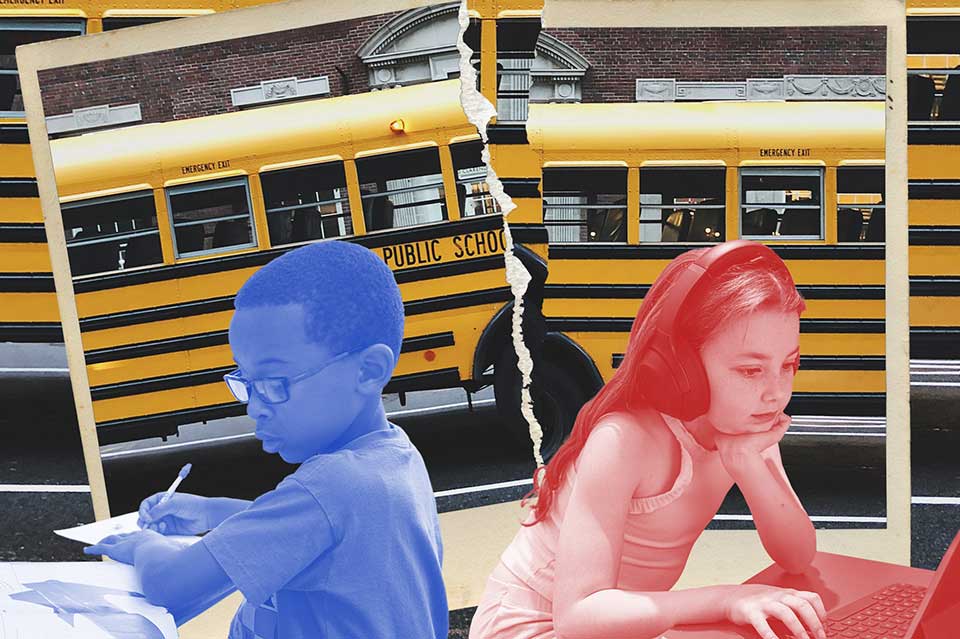Brandeis University Admissions
Learning Beyond the Classroom

Students in Professor Derron Wallace's "Sociology of Education" class analyzed a large survey of families whose children attended Boston Public Schools via remote learning during the COVID-19 pandemic. The class' final report highlighted racial inequalities.
Starting in the fall, as part of the Community Engaged Scholars Program, students will be able to connect their commitment to community service directly to their studies.
Several specially created courses will offer students the opportunity to work with community organizations with a focus on redressing inequities and promoting social justice. The goal is to provide students with the knowledge, skills and resources necessary to serve as ethical, respectful and responsible agents of service and of social change in their local, national and global communities.
Students will have the opportunity to learn the academics behind civic engagement and community service from field-leading faculty across multiple disciplines. They will learn about theories of change, foundational practices of community engagement, different modes of service, policy analysis and advance advocacy.
The program will be supported by the newly formed Vic and Bobbi Samuels ’63 Center for Community Partnerships and Civic Transformation.
Consider the "Sociology of Education" class recently taught by Assistant Professor of Education and Sociology Derron Wallace. It typifies the type of course that will be offered as part of the new Community Engaged Scholars Program.
Working with the Boston public school system, students analyzed a large survey of families whose children attended Boston public schools via remote learning during the COVID-19 pandemic. Their class' final report, "Addressing Equity Gaps in Public Education," highlighted racial inequalities, with Black and Latinx families reporting a greater need for technology, such as laptops and high-speed internet, than white families.
The report also included recommendations to help the schools offer more just and equitable learning opportunities for all students.
"Waltham Speaks: Multilingualism, Advocacy and Community" is another class that is representative of what will be offered as part of the Community Engaged Scholars Program.
Taught last spring by Senior Lecturer in Education and Elementary Faculty Leader Rachel Kramer Theodorou, the class focused on how schools and community organizations in Waltham, Massachusetts, address inequities faced by residents who have immigrated to the area and/or are multilingual.
Students in the class were assigned an internship with approximately 4-6 hours per week of work with several different Waltham-based organizations.
“This class gave me hands-on experience seeing what small organizations can do for education.”

Zoe L. ’23
Zoe L. ’23 worked with Waltham's public library system to compile a comprehensive list of resources and programs offered to the city's ESL (English as a Second Language) population.
She interviewed organizers of these outreach and educational efforts, gaining an appreciation of their vital role in addressing inequities in the community. She also saw how immigrants themselves often created and staffed these initiatives.
Zoe's research will have a lasting impact. She helped organize a biannual meeting among community organizers serving the language learning population to discuss ways of improving their services and coordinating advocacy efforts.
"We can read articles and look at data all day, but you need to hear from the people in the community to understand what's really happening," Zoe said. "This was one of the most eye-opening classes I've taken at Brandeis."
Zoe plans to work for an educational nonprofit after graduating.
"This class gave me hands-on experience seeing what small organizations can do for education," she said.
Eric R. ’21 was also in the Waltham Speaks course. He worked as an assistant teacher in an ESL class at Waltham High School.
The class met every day for 45 minutes, and Eric did everything from leading discussions to organizing trivia contests for the students to help them learn English.
Eric said language barriers kept many of the students in the class from fully participating in school. But the ESL class, he said, was a place they felt comfortable speaking up and joining in discussions.
"It's my passion to make sure all students are seen and heard," he said. "This class helped me to go about that."

